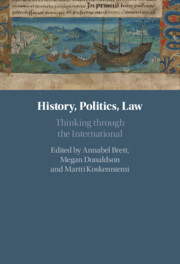Book contents
- History, Politics, Law
- History, Politics, Law
- Copyright page
- Contents
- Acknowledgments
- Notes on Contributors
- Introduction History, Politics, Law
- Part I Methods, Approaches and Encounters
- Part II Thinking through the International
- Law and Constructions of the Political
- Empires, States and Nations
- Institutions and Persons
- 9 The [In]Hospitable World
- 10 Ventriloquism in Geneva: The League of Nations as International Organisation
- Economics and Innovation
- Gender
- Index
10 - Ventriloquism in Geneva: The League of Nations as International Organisation
from Institutions and Persons
Published online by Cambridge University Press: 28 September 2021
- History, Politics, Law
- History, Politics, Law
- Copyright page
- Contents
- Acknowledgments
- Notes on Contributors
- Introduction History, Politics, Law
- Part I Methods, Approaches and Encounters
- Part II Thinking through the International
- Law and Constructions of the Political
- Empires, States and Nations
- Institutions and Persons
- 9 The [In]Hospitable World
- 10 Ventriloquism in Geneva: The League of Nations as International Organisation
- Economics and Innovation
- Gender
- Index
Summary
For international lawyers, the League of Nations is an institution of great symbolic and doctrinal importance. With its quasi-universal membership (‘universal’ of course heavily qualified), open-ended mandate, and inauguration of an ‘international civil service’, the League broke from the more limited institutional forms of nineteenth-century interstate cooperation, and helped shift ‘international organisation’ from a general aspiration of ordered interaction to a more specific legal category of inter-governmental entities.1 However, the League was an irritant in the international legal order as well as an agent of law’s expansion. It posed new legal questions concerning its own status and personality; the nature of relations with states and others; and the regulation of officials working within it. The emergence of the League thus offers a revealing vantage point on the workings of early-twentieth-century international legal thought, and the modes of analysis we can bring to bear upon it.
- Type
- Chapter
- Information
- History, Politics, LawThinking through the International, pp. 253 - 282Publisher: Cambridge University PressPrint publication year: 2021



